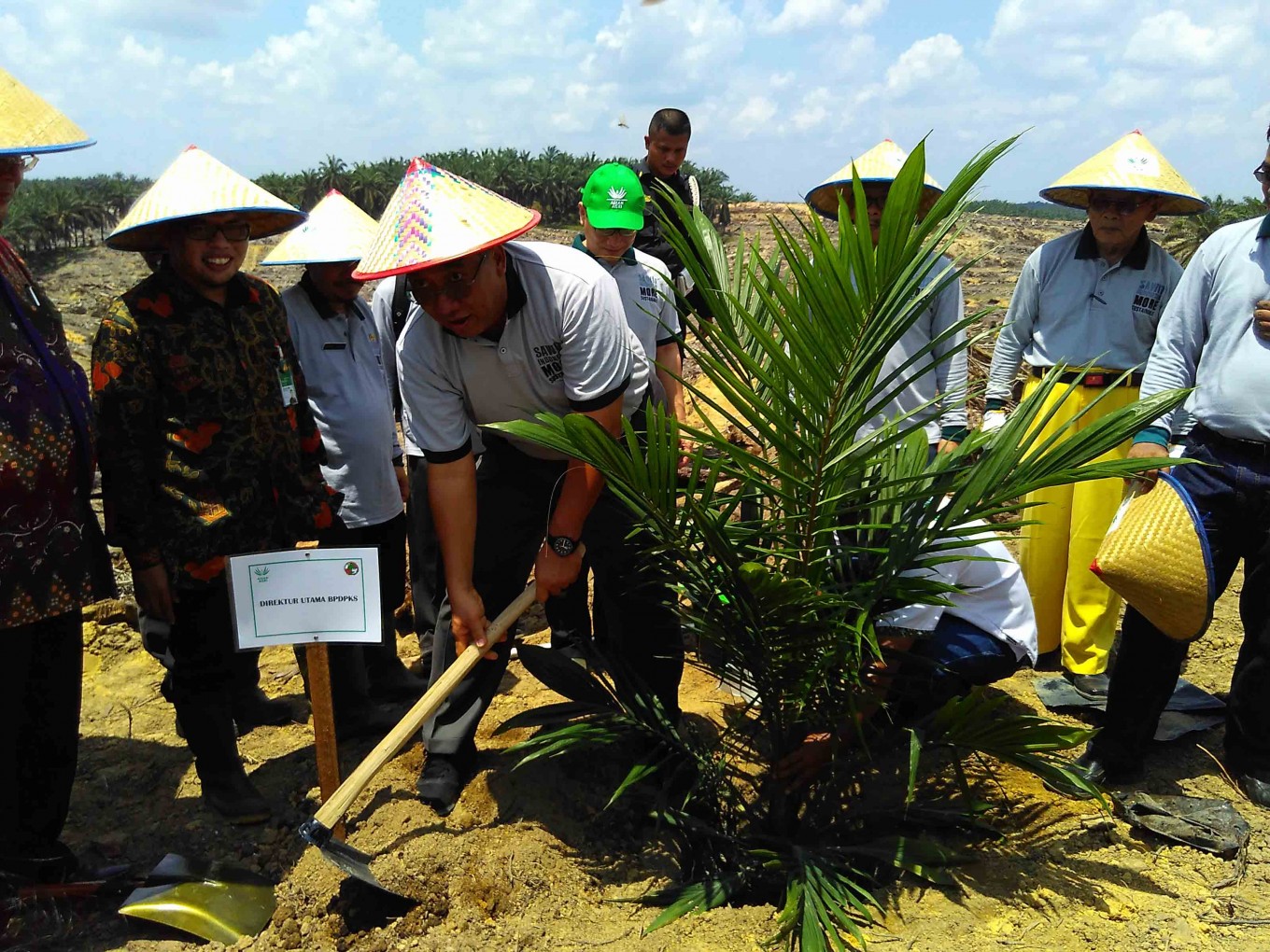Popular Reads
Top Results
Can't find what you're looking for?
View all search resultsPopular Reads
Top Results
Can't find what you're looking for?
View all search resultsAiming for a bona fide sustainability platform
The scale and environmental, social and economic impacts of the palm oil industry have made it one of the most scrutinized. Therefore, the sustainability of palm oil is seen as a new model and flagship for commodity-based industries in finding the most acceptable and widely recognized platform of sustainability for other commodities to learn and replicate.
Change text size
Gift Premium Articles
to Anyone
T
he scale and environmental, social and economic impacts of the palm oil industry have made it one of the most scrutinized. Therefore, the sustainability of palm oil is seen as a new model and flagship for commodity-based industries in finding the most acceptable and widely recognized platform of sustainability for other commodities to learn and replicate.
Palm oil attracts a number of stakeholders to develop various sustainability standards and platforms with unique attributes competing for recognition and buy-ins from both the markets and producers.
There are five types of palm oil-relevant sustainability platforms based on the originator and leading organizations.
The first is government-led initiatives, such as mandatory Indonesian Sustainable Palm Oil (ISPO) and voluntary Malaysian Sustainable Palm Oil (MSPO).
These sustainability standards based on compliance with applicable laws and regulations on palm oil create no tractions in the EU market as they are seen to add no value.
Second are market-driven multi-stakeholder initiatives such as the Roundtable on Sustainable Palm Oil (RSPO) and International Sustainability and Carbon Certification (ISCC). These two schemes are widely recognized by both the market and producers. While RSPO-certified sustainable palm oil dominates the CSPO market in EU, the ISCC-certified is in the frontline of CSPO use for biofuels.
Third are NGO-led initiatives, for example the Rainforest Alliance Certification using Sustainable Agriculture Network (RAC-SAN). This initiative targets a few niche producers and a subsequently small portion of the market limited to those subscribing to the NGO’s initiative.
Fourth is an initiative of a coalition of producers, including the Palm Oil Innovation Group and newly self-dissolved IPOP. The challenges of this business-sponsored platform lie in convincing other players to join in the group and in securing positive responses from both the government and the market. This scheme eyes a special portion of special products for the niche market.
Fifth are initiatives by international organizations, such as UNDP with the Indonesian Palm Oil Platform (INPOP). This initiative is attached to other government-led platforms and designated to help strengthen the ISPO.
It is noted that among the five initiatives, the market-driven multi-stakeholders initiatives, i.e. RSPO and ISCC standards are the most recognized by the premium EU market.
Due to a lack of market traction and absence of demand for ISPO-certified palm oil, the government and concerned stakeholders are actively seeking ways to ensure the ISP is well-regarded and recognized by the EU markets to compete with other schemes.
In my opinion, there is ample opportunity for an ISPO to gain market recognition and access to premium EU markets, provided the government is committed to changing the way ISPO works and engage other key stakeholders, including reputed NGOs and palm-oil concerned groups, value chains, market and consumer groups under the principles of participation, transparency and accountability.
This is the first step toward building mutual understanding among producers, intermediary agencies and consumers of palm oil as a sine qua non of market recognition.
Strengthening the government-led initiatives entails introducing two systems of nominal sustainability under the current mandatory ISPO scheme, and development of a new voluntary ISPO PLUS system.
The existing mandatory ISPO certification needs to be consolidated as a minimum standard for palm oil sustainability. Under the current scheme, the government maintains the status quo and remains in charge of development of the ISPO certification system. ISPO-certified products are targeted for traditional palm oil markets, such as China, India and the domestic market.
Second, introducing a new set of ISPO PLUS scheme with a totally new institutional arrangement, a reformed market-oriented forum and a system to accommodate consumer demand. The role of government needs to be changed to become a facilitator and enabler in the new multi-stakeholder forum on incentivized ISPO PLUS for the premium market.
In order to gain market recognition, the reformed ISPO PLUS must be able to assess, understand and address market demand for robust sustainability standards and platforms. In return, the ISPO PLUS will be charged a premium for superior items produced by exceeding legal compliance.
In line with the spirit of business competition and efforts to establish the standards that meet “beyond the law” stipulations, the ISPO PLUS must be designed as a voluntary membership initiative.
There are four core conditions as prerequisites to achieving credible and robust sustainability standards recognized by the market. These are multi-stakeholder governance, stringent environmental and social standards, an accountable certification system and a traceability mechanism.
Multi-stakeholder governance allows all stakeholders equal opportunity to voice their aspirations and become eligible to partake in decision-making and standard-setting.
Through this multi-stakeholder process, the standards of ISPO PLUS with add-ons take into account market interests and consumer demands, while simultaneously incorporating producer concerns and aspirations. A common ground and mutual understanding is a modality for an applicable approach in securing green credentials for both producers and markets.
To gauge the level of robustness and credibility of the standards, the ISPO PLUS forum needs to register as a member of the International Social and Environmental Accreditation and Labeling (ISEAL), an international forum to examine sustainability standards. Such membership will further enhance the stature of the ISPO PLUS forum.
The certification system is another key area to ensure that the assessment and audit of the sustainability performance of members is in compliance with global standards. The system must demonstrate a high level of accountability and compliance.
To ensure compliance with the audit of the auditor or certifying body (CB), the forum needs to foster a partnership with a reputed audit accreditation, such as Accreditation Services International (ASI). The mechanism on oversight is key to maintaining credibility and confidence in the certification system.
The last aspect of sustainability platform is the need to ensure traceability of products from growers, including smallholders, mills, supply chains and refineries down to the market. Sustainability standards of palm oil must be augmented with a mechanism to verify and trace back to the first upstream source.
With the above assurances, the bona fide ISPO PLUS will be well recognized by premium market in EU. This will also help improve credibility of the existing ISPO scheme and allow the ISPO PLUS system to compete with other sustainability standards and platforms.
***
The writer is the vice president of the Roundtable on Sustainable Palm Oil (RSPO). The views expressed are his own.
---------------
We are looking for information, opinions, and in-depth analysis from experts or scholars in a variety of fields. We choose articles based on facts or opinions about general news, as well as quality analysis and commentary about Indonesia or international events. Send your piece to community@jakpost.com. For more information click here.










